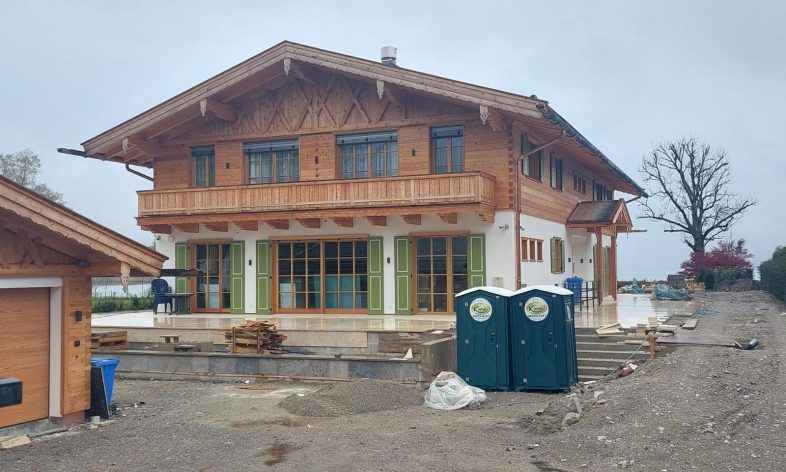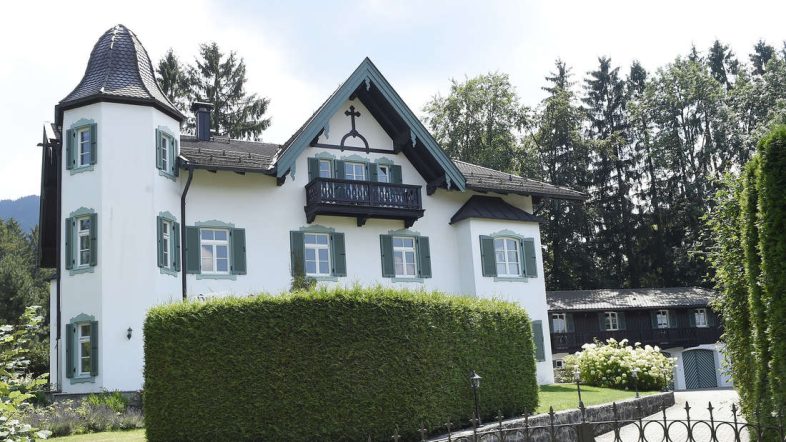Picturesque alpine landscapes attract a lot of wealthy people from across the globe. Russian oligarchs, sanctioned by the EU, are among those who own fashionable villas in this corner of the world. Nevertheless, the seizure of sanctioned assets is happening rather slowly.
From the start of the Russian invasion of Ukraine, governments of many European countries have been carrying out continuous seizure of Russian oligarch-owned properties. The process is still taking place now. In some countries like Germany, it is happening much more slowly than previously thought, but also has its success. On the 13th of May, the Federal Criminal Police Office (Bundeskriminalamt) seized the well-known ‘Luna’ yacht. The cost of such a yacht was estimated to be €400 million. According to the Bundeskriminalamt, the owner of Luna was part of the sanctioned list of oligarchs from the 8th of April. The name of the Oligarch is Farhad Akhmedov. Akhmedov deals in the energy sector and is a close associate of the Russian president. He bought the yacht earlier, from Roman Abramovich. Luna is not the first ‘easter egg’ found in the port of Hamburg. A month before this, the Bundeskriminalamt seized yet another yacht of another Russian Oligarch – Alisher Usmanov. His yacht, Dilbar, was valued at €500 million.

Unfinished villa of Alisher Usmanov in Rottach-egern. Photo from merkur.de
This yacht is not the only property owned by Usmanov in Germany. From the start of Russia’s war, independent activists have been trying to turn the public’s attention to luxurious villas belonging to Russians – many of which are situated in the valley surrounding the Tegernsee lake. Three of such villas there belong to Usmanov. As early as March, the mayor of Rottach–eggern, a nearby town, stated his wish of settling Ukrainian refugees in the villas. However, the seizure of the villas and other properties of Russian oligarchs stalled since. As written by the New York Times and German media who investigated this issue (including merkur.de), the villas in the picturesque corner of southern Bavaria have been bought with the use of fictitious persons and payees. This kind of scheme is quite common for Russian oligarchs all over the EU. In some countries like Italy, the authorities came up with effective mechanisms on determining whether such villas really belong to Russian oligarchs or the stated fictitious persons. In Germany, this is a barrier that is still yet to be overcome. However, as claimed by merkur.de, there are signs that EU sanctions are slowly overcoming such barriers. One of Usmanov’s villas in Rottach-egern has been successfully seized. After the oligarch departed Munich for Tashkent on the 28th of February, construction over his villa continued for another few weeks. According to merkur.de, the construction cost was €20 million. It is clear now that the company building it has abandoned the project, as the villa sits unfinished. The companies involved in the project are frustrated as their client owes them large sums of money.
Tegernsee became a popular destination for the wealthy in the 2000s. Slightly later, Russian oligarchs started to appear in the area. Mikhail Gorbachev was one of the people that had a villa as well, in Rottach-Egern. The last leader of the USSR liked to travel here and in 2006 bought a fashionable hundred-year-old house on the side of the lake. The daughter of Gorbachov, Irina Virganskaya, refurbished the villa in 2008, as reported by the local newspaper Tegernseer Stimme. Nevertheless, in 2017, it came to notice that the property was being sold. In March 2022, German media reported that the company that bought the property from the Gorbachev family, reconstructed it and established a partition into three condominiums of the property, each of which cost €3 million. Irina Virganskaya became the owner of a slightly smaller villa in the same area of southern Bavaria. Among other Russians which own various fashionable properties on the Tegernsee, was Ivan Shabalov, the owner of a metallurgic company which delivers pipelines for Gazprom. Overall, this beautiful valley is also a favourite among prominent Germans as well. Moreover, according to the Deutsche Welle, Uli Hoeness, the owner of FC Bayern Munich, Hubert Burda (owner of Hubert Burda Media) as well as the leader of the CDU opposition party Friedrich Merz are all property owners there.

‘Hubertus’ villa, which until 2018, belonged to Mikhail Gorbachev
Bavaria, like many other picturesque locations in Europe, has always aroused Russian oligarch’s interests. In the town of Garmisch-Partenkirchen, where the G7 summit is planned to gather in June, is also a town where oligarch Roman Abramovich owns a villa. The Leitenschlößl villa is situated in the picturesque corner of Partenkirchen with a view of the Zugspitsze massif – the highest peak in Germany. The house is over 100 years old. In 1896, it was built by Emmanuel von Seidl. Abramovich reconstructed the villa and added a swimming pool, which can be accessed from the villa by taking a glass corridor as described by bild.de.
For 17 years, the villa belongs to Abramovich, who is no longer able to visit it due to EU sanctions. The mayor of Garmisch-Partenkirchen stated that a total of 192 Russian citizens are registered in the town. ‘However this is not such a big problem. These are people who simply have flats and houses’ declared the mayor, cited by merkur.de.
It is important to keep in mind that Ukrainians are among those who own prestigious property in Garmisch-Partenkirchen as well. One of the most expensive villas here – ‘Gloria’, was owned by Mykola Huta (owner of agricultural producer ‘Mriya’), and was later bought by the owner of ATB, Viktor Karachun.
Last week, the Federal Ministry of Finance of Germany alongside the Federal Ministry for Environment and Nature Conservation proposed a new decree concerning the speed of implementing sanctions, which would intend to make the seizure of assets of Russian oligarchs a lot easier. The proposed law aims to create a legal basis from which it would make the process of existing EU sanction implementation more practical. It is expected to be voted on before the parliamentary summer break.

